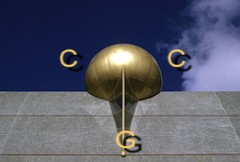 |
| Ikechukwu Uche |
Super Eagles head coach, Stephen Okechukwu Keshi has opened up on why in form Spain-based attacker, Ike Uche wouldn't make his Brazil 2014 World Cup squad.
Keshi, who only last week dubbed the Villarreal hit man an undisciplined player said he can't call up a player who would refuse to play to instruction.
He noted that Ike Uche almost stopped Nigeria from breaking her 19-year old Nations Cup jinx in South Africa with his "big boy" approach to the game.
Keshi told Mtnfootball.com that Ike Uche simply refused to play to instruction in the final match against Burkina Faso, a situation which almost cost Nigeria the trophy.
Keshi's words: "Ike Uche's problem is that he wants to dictate how we play in Super Eagles, he wants to tell us the systemwe're playing is not good. Uche has a very bad habit, that if you put him in the game he is not playing to instructions and he did that in the final of AFCON against Burkina Faso, he almost cost us.
"Again he did that against Zambia, in the second match when (Efe)Ambrose was given a red card. What we told him to do, he was doing the opposite. And if you don't respect your team mates and you don't respect the team, then there is no point. I know he cannot do that in his club, then why do it in the national team?I don't think I need a player like that in the team."
Uche has been one of Nigeria's reliable goal scorers and had scored 12 goals this season for Villarreal.
On Monday night, the striker returned to action after he was sidelined by injury for two weeks.
He last featured for Nigeria in the final of the 2013 Africa Cup of Nations against Burkina Faso and it was in-fact a rebound from his goal-bound effort that ultimately led to the game winning goal for Nigeria.
It is rather sad but not suprising that Keshi is once going down this path of always squabbling with professionally established players in a national team set-up.
He did the same thing with Togo as he and Emmanuel Adebayor literally almost came to blows over what was said to be the latter's refusal to allow Keshi "be his agent".
The same thing happened with Mali as he again clashed with Mali's established stars, including former Barcelona star Seydou Keita.
Having been unceremoniously fired from those two jobs, Keshi has fought with just about every established player in the Super Eagles set-up (never even mind Osaze Odemwingie who on his part has a history with coaches); including the likes of Joseph Yobo, Mikel Obi, the Uche brothers (Kalu and Ike), Victor Anichebe.
The players he has not fought with, he has chosen to play god with their international career and essentially froze them out of the national team while parading average players that were thoroughly exposed at the FIFA Confederations Cup.
The truth is that Keshi views the Nigerian national team as his "personal property" much like he did when he was a player.
Keshi must remember that if the legendary Clemence Westerhoff had also chosen to play god with his (Keshi's) international career, he would not have had the opportunity to play at the soccer global showpiece in 1994.
Nigeria must do well in Brazil 2014. For that to happen, we need our best players both at home and abroad and this should not be an opportunity for a coach or other members of the technical crew (including the NFF itself) to be complicit in a process where unproven players are being chosen based on parochial, ethnic, business or other sentiments.
If Keshi can't manage the complexity of personalities within the national team, then he needs to find another line of work and not expose Nigeria to ridicule (as he did at the Confederations Cup in 2013) on the world stage.

















